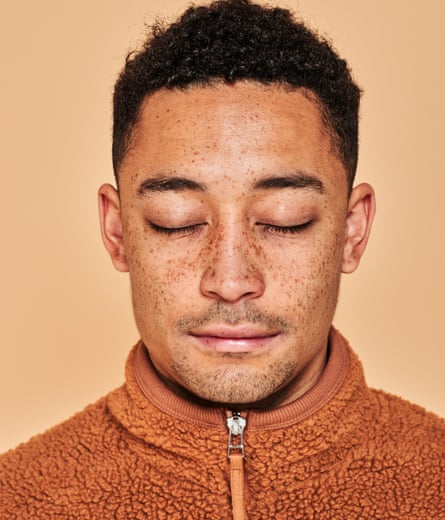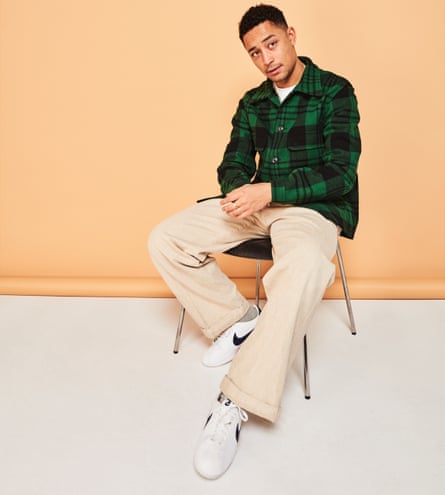Hello, I’m Ben,” says Ben Coyle-Larner, a 24-year-old British rapper better known as Loyle Carner. He’s slumped in a photographic studio in east London, wearing a vivid orange gilet: “I look like I’m signalling a plane down.” He carefully studies the small print on an impressive array of cold and flu remedies, wondering whether you can combine, say, Strepsils with Beechams All in One. “The only good thing about feeling like this,” he muses, “is you can play PlayStation and not feel guilty.”
The Guardian’s product and service reviews are independent and are in no way influenced by any advertiser or commercial initiative. We will earn a commission from the retailer if you buy something through an affiliate link. Learn more.
Sadly for Coyle-Larner, there’s an interview to do before he can “ride around on a horse and shoot things”. He seems sanguine about this though, mainly because his girlfriend is a secondary school teacher and he feels a bit ashamed if she comes home from work and he’s hunkered down on the sofa playing games. “So yeah, I have to make sure everything’s put away,” he says, and just about manages a laugh.
I’d been wondering before meeting Coyle-Larner how much “Loyle Carner” is an artistic creation, like Stephen Colbert or, obviously, Lorraine Kelly. But it doesn’t take long to realise that Coyle-Larner isn’t the type to hide behind an alter ego. (His stage name, a spoonerism, is a nod to his own dyslexia.) In our conversation, he talks with winning openness and intelligence about anything and everything: bereavement, his ADHD, why all young adults should be offered free counselling, funded by the taxpayer. The only time he clams up is when I ask where his girlfriend teaches. “Who knows?” he replies, airily, which is fair enough.
Instagram lets people show everything, but nothing that’s real
This honesty will be familiar if you know Loyle Carner’s music. He arrived for many of us in 2017 with his debut album Yesterday’s Gone. While hip-hop lyrics are often obsessed with money, status and women, Coyle-Larner gravitated to subjects that were more personal and vulnerable: the dominant female presence on the record was, in fact, his mum, Jean. He wrote instead about his father leaving their family when he was young and his stepfather coming into his life, only to die in his 40s from an epilepsy-related seizure. The material was atypical, but his knack for storytelling, with lines delivered mellifluously to laid-back beats, struck a chord: Loyle Carner was nominated for the Mercury Prize in 2017, and two Brit awards.
Now he’s back with a new album, Not Waving, But Drowning. It finds Coyle-Larner in a different stage of his life – happier, broadly speaking; more financially secure, certainly – but still keen to acknowledge that the transition into adulthood is rarely straightforward. “It’s the only way I know how,” he says of the confessional nature of his lyrics. “I was raised by women, by my mother and my grandmother, and they would talk about how they felt every day. And because I was with them I’d go, ‘I’ll talk about how I feel!’ It was great, it was liberating, it helped me a lot. But back then, women were the ones who communicated and men didn’t communicate, right? It was seen to be weak. That’s changing a bit now, incredibly, but we’re still in the early stages of the evolution of man.”
The album’s title comes from Stevie Smith’s 1957 poem Not Waving But Drowning, about a man who dies because bystanders are sure that he’s just thrashing around, having a great time in the water. When Coyle-Larner read it again recently, he found a strong personal resonance. “I see myself in it,” he says. “Because I’ve had some small success, moderate, tiny success on the grand scale of success, but enough that people think I’m going, ‘Look at me in my new house with my beautiful girlfriend’. And, sometimes, especially when the album process was beginning, I was drowning! And everyone thought I was hanging out.”

Being upfront about these insecurities is especially important, Coyle-Larner thinks, in the social media age. “People show everything and nothing because they are not showing anything that has real meaning,” he says. “If you looked at my Instagram, you’d go, ‘Wow, things are really kicking off for this guy’. But yeah, my little brother wants to go to uni, I’ve got to figure out how to pay for that. I’ve got to sort my mum’s house out. I’ve got my mortgage to pay. My missus has to mark essays, so we’re trying to navigate a better way of how I can not be annoying when she comes home!”
He breaks into a grin. “It’s life! Life is the thing. We don’t see that. It’s probably to do with my ADHD: I say a lot of things that I shouldn’t say just because I like to hear my own voice.”
Most things you might want to know about Coyle-Larner can be found in his songs. He was born in south London, grew up in Croydon. His biological father was of Guyanese descent; his mother, a teacher specialising in learning difficulties, had family links to Scotland. When they separated, Nik – a music obsessive who performed as Steven Vengeance – came into his life and Coyle-Larner got a stepbrother, Ryan. “I’m mixed race,” he says, “but I grew up in an all-white house with brown skin. And so, if you’re raised by a pack of wolves, you’re a pack of wolves.”
At secondary school – first at Whitgift, a private school for boys, then the Brit School for performing arts – Coyle-Larner often felt like an outsider. When he played football, he tended to find himself on teams with the black kids, but then when friends talked about their African heritage, he’d have to ask what a dashiki was. He remembers: “So I’m with the white guys again.” A line from the Earl Sweatshirt song, Chum, sums it up: “Too black for the white kids, and too white for the black.” Coyle-Larner felt the difference particularly keenly in the music he listened to. He loved rap, especially Common and Mos Def, but his stepfather also put him on to “stuff that people were saying I shouldn’t listen to, I can’t listen to: Bob Dylan, Leonard Cohen, David Bowie, Roy Ayers, the Cure. Loved the Cure,” he says.
At this time, though, Coyle-Larner was more interested in acting than making music. He auditioned for Drama Centre London, a prestigious part of Central St Martins whose alumni include Tom Hardy and Michael Fassbender. “Something crazy like 7,000 people apply every year and 20 people get in,” he says. “But yeah, I applied because everyone from my school was doing it – and I got in. I’d always wanted to do acting, because it was something I didn’t have to study, there was no written work for it, and I was half decent at it.”

Coyle-Larner’s plans changed in 2014, when his stepfather died. He decided to drop out to look after his mum and stepbrother: “I was, like, ‘I can either keep spending £9,000 a year and go into debt or I can make some money, which would make more sense.’” He considered becoming a chef – he started cooking aged six, when he was first diagnosed with ADHD, and it had always been a passion – but he figured that rapping might pay the bills faster. The songs came quickly, propelled by grief (“Everybody says I’m fuckin’ sad/Of course I’m fuckin’ sad, I miss my fuckin’ dad.”) Within seven months he had an EP, A Little Late. He also began to appreciate that his broad music tastes growing up might help him stand out in a crowded field.
“When you’re mixed race, you can feel like you’re nothing,” says Coyle-Larner. “But what I started thinking was, ‘If I’m nothing, I can be anything. And I can be everything.’ People don’t know where I’m from – people think I’m Mexican, people think I’m Pakistani, people think I’m Brazilian. African, Scottish, Irish. I can be from anywhere. It’s like being a shape-shifter.”
Not long after his stepfather died, Coyle-Larner began seeing a counsellor. He hasn’t talked about it in interviews before, but he hopes his experience can help others. “My mum was, like, ‘You should do it,’” he recalls. “But I was 18 and I was, like, ‘Fuck that, it’s ridiculous, I’m not crazy, there’s nothing wrong with me, I’m not weird.’ But my mum and my brother did it and I was just holding all of their stuff. They’d come home and tell me, and I was just dealing with all of this pressure and I couldn’t take it. I was having quite a bad time, having panic attacks. I was in a really low place. So I went to see this woman and ever since then my life has just got better and better and better. So why would I stop?”
He now goes whenever he has time, maybe once a month, because he finds it stops him downloading on his mother and his girlfriend. “It’s essential, especially in a high-octane, stressy, angry, fake, bullshit world like the music industry,” he says. “You’ve got to have at least one person you can chat to who doesn’t have an ulterior motive.”

Coyle-Larner doesn’t set out to be political, but he is thoughtful and opinionated, especially on subjects he has personal experience of, whether it is the importance of not stigmatising therapy to the dangers of medicalising ADHD. One of his sidelines is a cooking school, which has a jokey name – Chilli Con Carner – but a serious remit: to teach young adults with ADHD the joys of preparing food.
On Not Waving, But Drowning, too, he takes on serious issues. One song, Looking Back, is an investigation into his Guyanese heritage and includes the line: “My great grandfather could have owned my other one.” The poet Benjamin Zephaniah wrote the liner notes for the new record and describes the track as Coyle-Larner’s “own personal black consciousness movement”. The rapper likes the description: “I didn’t feel like I was justified to talk about race, but as I started to chat to my biological father a bit more, I felt more allowed to go, ‘Actually, yeah, I do have a black history and I need to talk about it’.”
Don’t go out with a pop star. We’re weirdos, not heroes
Elsewhere, he writes unblushingly about meeting the woman he wants to settle down with. Coyle-Larner admits there’s something Freudian about him falling in love with a teacher, but he likes that she’s not involved – or much interested – in the music business. “There’s no point going out with a pop star,” he says, smiling. “We’re not heroes, we’re weirdos.”
Not Waving, But Drowning is accomplished, mature work: an album that develops the sound and ambition of his debut. Coyle-Larner can’t understand why artists get criticised for changing after they become successful, because for him, evolution is the point. “You’re doing all this stuff, and why?” he asks. “You’re not doing it all to stay the same! I wasn’t working this hard so I could be the same 16-year-old who couldn’t chat to girls and nobody liked. And wanted everyone to like him all the time. Why would I do that? Everyone’s like, ‘He’s changed.’ And it’s like, ‘Yeah, fucking hell I hope so. I was a loser!’”
Not Waving, But Drowning is out now

Comments (…)
Sign in or create your Guardian account to join the discussion